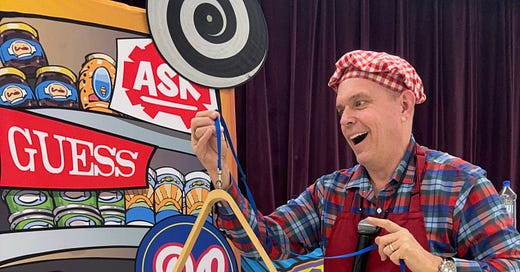Assembly shows in schools --a market for savvy magicians
Educational Assembly Shows for schools. A pot of gold for the very best.
**The Magic of Learning: How Magicians Are Transforming Elementary Education with assembly shows for schools**
In the world of magic, where illusions captivate and wonder never ceases, a quiet revolution is unfolding in the corridors of elementary schools across the United States. While many magicians chase the spotlight of Las Vegas or the glamour of corporate events, a growing number are discovering a more rewarding stage—educational school assembly show programs. This unexpected niche not only fills their calendars but also their bank accounts, with top performers earning upwards of $300,000 annually.
The secret? A well-crafted blend of entertainment and education that aligns with school curricula and enriches the student experience.
Traditionally, magicians have thrived on weekend gigs. From Friday night corporate dinners to Saturday birthday parties, the weekends are their domain. Yet, the most successful magicians today are those who perform Monday through Friday in school gyms and auditoriums, where their magic serves a dual purpose: to entertain and to educate.
Elementary schools, ever in pursuit of innovative ways to reinforce classroom lessons, have become fertile ground for magicians who can weave educational narratives into their acts. It’s not enough to simply dazzle with card tricks and illusions. Magicians must craft shows that embody educational themes—be it science, history, or math—while also addressing important social issues like diversity, character education, and anti-bullying. This is the lucrative assembly show market that savvy performers have made their ‘bread and butter.”
The challenge lies in creating a performance that is both magical and meaningful. It’s here that magicians like Doug Scheer, a veteran performer with over 30 years in the school circuit, excel. "The trick," says Scheer, "is to engage the students' imaginations while seamlessly integrating educational content. You want them to leave with nuggets of knowledge but delivered in a new and exciting way that the teachers can’t do."
Scheer’s shows often include themes that resonate with young audiences, such as environmental conservation and teamwork. One of his twelve 45 minute shows teaches children that amazing science experiments can be safely performed with simple household items. That act, "Wacky Science," uses optical illusions and chemistry to explain basic scientific principles, turning complex ideas into accessible and engaging experiences. "Kids are naturally curious," Scheer explains. "If you can tap into that curiosity, you’re not just making kids laugh and wonder—you’re sparking a lifelong love of learning."
Moreover, these performances serve an important social function. For many students, particularly in underserved areas, a school assembly show might be their first exposure to live theater. Here, they learn the etiquette of being an audience member—when to laugh, when to clap, and when to sit in rapt silence. It’s an introduction to a world of culture and civility that screens and digital devices can’t provide.
As schools seek to broaden their educational offerings, magicians are increasingly seen as valuable partners in education. The goal is not just to reinforce what is taught in the classroom but to introduce children to new ideas and ways of thinking. Programs that fail to foster appropriate audience behavior or align with educational goals are less likely to be invited back.
For magicians, this market presents an unparalleled opportunity to make a difference while making a living. It’s a testament to the transformative power of magic, where the real trick is not in the illusion itself but in the ability to inspire and educate the next generation. As these performers take the stage, they are not just magicians—they are educators, mentors, and dream-weavers, leaving a lasting impact on the hearts and minds of young audiences.
This introductory Substack of Doug Scheer will delve deeper into the nuts and bolts of working in elementary schools full time. Please subscribe to be notified whenever a new article is posted.
Doug Scheer of Scheer Genius Assembly Shows has been a leader in the educational school show market since 1987. Learn more about his twelve educational shows for schools at at http://www.assemblyshows.com




Angelique Steelgrave here leaving the first comment! I am signing up! (Before my "magic" career I and my ex operated a children's theatre company that exclusively performed in schools and libraries. Pre-internet, so of course we have nothing to show for it all these years later. LOL)